Verona’s spectacular ancient Roman amphitheatre is an unforgettable place to enjoy grand opera beneath the starry summer sky. Fleur Kinson is dazzled by the magic atmosphere and the vocal fireworks as she attends the Verona Amphitheatre Opera…
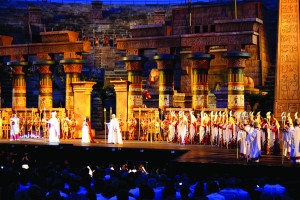
Sweat, fear, noise, blood and anguish. Not much has changed in Verona’s giant amphitheatre over the last 2,000 years. Where once gladiators fought to the death, now mighty tenors and sopranos writhe with the appearance of every tortured passion. And the emotion isn’t just limited to the performers; the audience have always been wracked with it too. Back in Roman times 20,000 spectators jeered and roared with blood lust in this place. Today glamorous aficionados sit in silent rapture before exploding into frenzied applause. “Bravo, Marcelo!” they scream as the fat man finishes a particularly tricky aria. “Brava, Sofia!” they holler as she sings a last exquisite note and slumps death-like to the stage. Now as long ago, feelings here are running high.
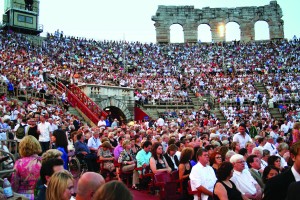
THE CITY OF ROMANCE
It’s fitting that the world’s largest open-air opera festival should be held every year in Verona. Thanks to Shakespeare’s pair of star-crossed lovers, this little city is forever linked with idealistic love and doomed passion – two of opera’s perennial themes. Perpetuating the city’s loved-up atmosphere, Verona’s pretty, pink-hued streets are filled each summer weekend with moony-eyed couples of every age and nationality, dutifully making their pilgrimage to this famous città dell’amore.
But forget the city’s fake Romeo and Juliet locales; the most genuinely romantic building in Verona is its spectacular Arena – the third largest and best preserved of all surviving Roman amphitheatres. Undeniably lovely in its white and pink limestone, the gigantic oval dominates the city centre, and remains Verona’s single most impressive sight. Now occupying a grand piazza edged by lovely outdoor cafés and restaurants, the Arena has survived the ravages of time (and, recently, of earthquakes) to become one of the world’s most arresting event venues.
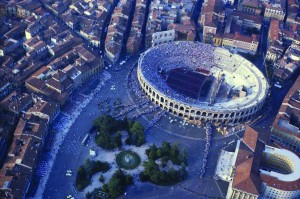
Of course it no longer hosts the gory combats, duels, public executions, bullfights and bear-baitings of its past (many of which continued to take place here until the 1890s). Today the venerable ring is most famed for its annual opera festival. Half a million spectators roll up every summer to revel in sublime music and sumptuous on-stage spectacle – nabbing seats that range from a mere €20 to almost ten times as much. This wide range of prices reflects that fact that, in Italy, opera is a normal enthusiasm, irrespective of earnings or social class. It’s not, as you find elsewhere, just an entertainment for the elite.
And the Arena is an ideal place for it. It has astonishingly good acoustics – something discovered almost by accident in the 1850s when someone first thought of staging an opera here. Even now, singers perform free from microphones, letting the natural shape of the arena amplify their voice. So when that barrel-shaped woman down on the stage thrillingly fills the entire space with noise, she’s doing it for real. The unusually large stage (23m wide by 30m deep) is particularly well-suited to grand opera, encouraging lavish set design and spectacular production.
Dancers, horses, camels, big cats, elephants – all have sported across this immense stage-space in various productions. Temples, pyramids, the reedy banks of the Nile – all have been constructed here.
ENCHANTED EVENING
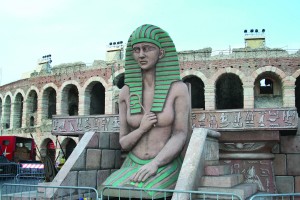
Because its ancient Egyptian setting provides such scope for magnificent stage-sets, Verdi’s Aida is on the Arena’s opera festival menu every year, and is always the first performance to kick off the season. The summer list also includes three or four other big crowd-pleasers, typically from among Carmen, Tosca, Turandot, Nabucco, La Traviata, La Bohème, and Madame Butterfly. It was Aida that spawned the whole festival back in 1913, when a triumphant performance was staged here to mark the centenary of Verdi’s birth (with Puccini and Franz Kafka among the audience members that night). Wartimes excepted, the summer music hasn’t stopped since.
But acoustics and stage-sets aside, it’s the sheer atmosphere of the Arena that really knocks you out. From the minute you join the evening queue outside to the moment you exit breathless into the small hours of the morning, the sense of enchantment never really fades. Just going in is a brief mini-drama. You slip through an ancient archway and find yourself in a dark, subterranean-like cavern, with water dripping from the old Roman concrete overhead. Disoriented, you discover plush velvet curtains draped back to guide you, and you suddenly emerge, with dozens of others, into the vast arena. An expanse of red chairs fills its flat centre, and endless tiers of metal seats climb to the distant rim.
You take your seat in the soft evening air and watch people excitedly milling about in their opera-going finery. Behind them, the evening light slowly slips by degrees from pale turquoise to soft blue to starlit black. Banks of golden stadium lights come up, flashbulbs wink across the body of the crowd, and thousands of candleflames are held in flickering salute. And then, the moment the music begins, the chatter of 15,000 people turns to a breathless hush.
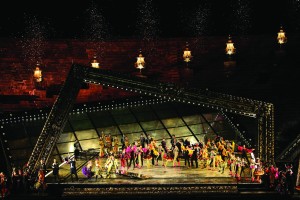
MUSIC OF THE NIGHT
Obviously Arena performances are of the highest standard, and if you’ve never experienced grand opera before, this is the perfect place to start. The quality is top-notch. Pavarotti, Domingo and their ilk have all appeared in the festival, and Maria Callas made her debut here. But because tickets are so laudably wide in price range, the spectators are an enjoyably mixed bunch. Refined aficionados who know every word sit alongside Lake-Garda-holidaying day trippers who’ve been roped in by their tour reps to see an opera for the first time. And not every newcomer is equally smitten by the art. During one of many intervals in
a wonderful performance of Aida,
I overheard an English speaking first-time opera-goer say to his friend, “The male singers are all right; I don’t mind the baritone. But I could do without the women and their high-pitched screaming.”
But should the performance or the stage-spectacle cease to grip your attention for a moment, there are plenty of pleasing distractions – the soft breath of evening wind that reminds you you’re outside, the bats that sparkle momentarily as they wing through the beam of stadium lights, the sumptuous outfits in the audience, the long and convivial intervals between the acts. All around, the place and the event never stop feeling exceptional. There’s more to an evening here than just the wonderful stuff you see on stage.
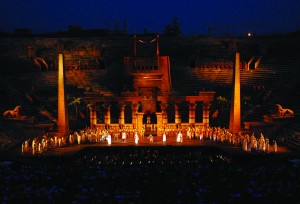
Which is handy, as an opera can sometimes turn into something of an endurance marathon. If you aren’t aware of this already, operas are very long. Don’t expect to be in bed by midnight, or even by 2am. Arena performances start at about 9pm, and you’re looking at four or five hours of entertainment thereafter. The fat lady can sing and sing, but still it ain’t over. Sitting till the very end, music-dazed and happily drowsy among thousands of other people, is just another part of the romance.
TIPS ON GETTING THE BEST OUT OF OPERA IN VERONA
➤ You’ll enjoy a performance much more if you know the opera’s plot in advance. Don’t expect to be able to follow a convoluted story sung in Italian! Read up on your opera before coming. You’ll be glad you did.
➤ There’s no strict dress code at the Arena, but why not seize the chance to dress up and make an occasion of it? Audience attire ranges from jeans to black tie. Go for smart casual at the very least – it’s worth the effort.
➤ Night air can grow surprisingly cool, no matter how hot the day. Play it safe and carry a jacket or shawl with you. Note that there’s no cloakroom.
➤ Unless you’re in the best seats, there’s no padding to comfort the derriere. Bring a small cushion with you (an inflatable one is ideal), or hire one for a small charge (about €4), which you’ll find inside the Arena.
➤ Eat well before coming, as operas are not short! Bring food and drink with you if you like, but note that glass containers and metal cutlery are not permitted inside the Arena. Decant wine into a plastic bottle.
➤ Wheelchair-users are comfortably accommodated at the Arena. Do note that children under four are not allowed in the audience.
➤ After the performance, join the long, orderly taxi rank in Piazza Bra, or go to a late-night restaurant and carry on with the fun. On opera nights, some nearby restaurants stay open till 4am.
MORE INFORMATION
See online, www.arena.it, for specific dates and performances. Call +39 0458 005 151 to book tickets. Prices range from around €20 to €200, depending on the seat and day of the week.
